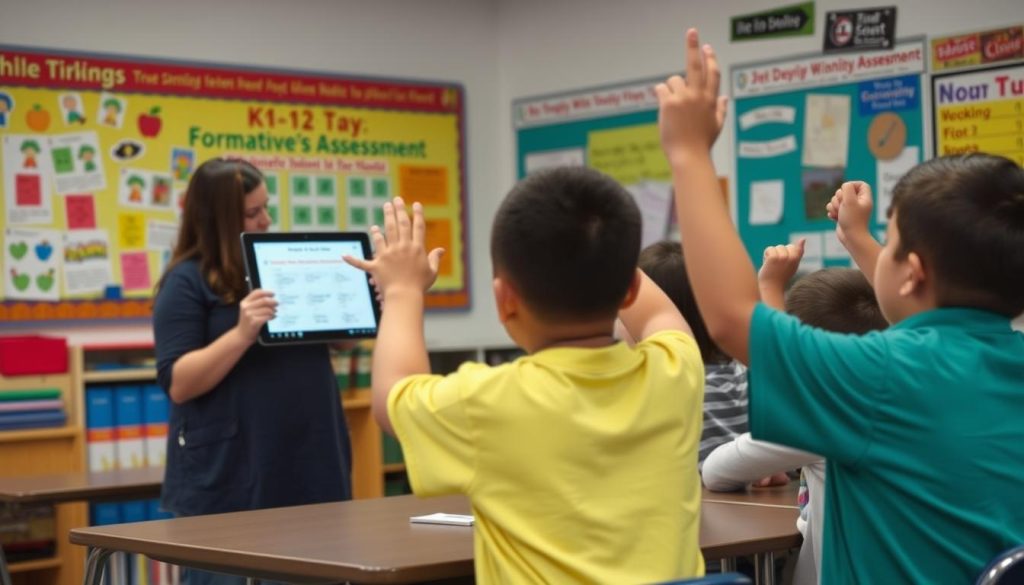In this comprehensive guide, we’ll explore how formative assessment techniques can enhance your teacher skills while examining the potential drawbacks that might arise. Whether you’re new to these methods or looking to refine your existing assessment strategies, understanding both sides of the equation will help you make informed decisions for your classroom.
What is Formative Assessment and Why It Matters
Formative assessment refers to a wide variety of methods that teachers use to conduct in-process evaluations of student comprehension, learning needs, and academic progress during a lesson or unit. Unlike summative assessments (like final exams or end-of-unit tests), formative assessment is ongoing and provides immediate feedback that both teachers and students can use to improve the learning process.
The primary goal of formative assessment is to monitor student learning to provide ongoing feedback that can be used by instructors to improve their teaching and by students to improve their learning. More specifically, formative assessments help teachers identify concepts that students are struggling to understand, skills they are having difficulty acquiring, or learning standards they have not yet achieved.
Developing strong teacher skills in formative assessment techniques allows educators to make adjustments to lessons, instructional techniques, and academic support. Professional development in assessment strategies has become increasingly important as education continues to evolve toward more personalized learning approaches.
“When the cook tastes the soup, that’s formative assessment. When a customer tastes the soup, that’s summative assessment.”
– Paul Black, Assessment Expert
According to a study from the Organization for Economic Co-operation and Development (OECD), formative assessment has been proven to be highly effective in raising the level of student attainment, increasing equity of student outcomes, and improving students’ ability to learn.
Types of Formative Assessment Tools for Classroom Success
Formative assessment encompasses a wide variety of techniques that can be tailored to different subjects, grade levels, and learning objectives. Understanding these different approaches can help you expand your teacher skills and select the most appropriate methods for your specific classroom needs.
Quick Check Methods
- Exit Tickets/Exit Slips: Short responses to questions at the end of a class period to demonstrate understanding of that day’s lesson
- Thumbs Up/Down: A quick visual check for understanding where students indicate their comprehension level
- One-Minute Papers: Brief written responses to questions about the main point of a lesson or remaining questions
- Strategic Questioning: Using high-level, open-ended questions that start with “why” or “how” to gauge understanding
Interactive Assessment Methods
- Think-Pair-Share: Students think about a question individually, discuss with a partner, then share with the class
- Classroom Polls: Real-time polling to gather student responses to questions
- Round Robin Charts: Small groups answer questions on charts that rotate between groups
- Participation Cards: Cards with “I agree,” “I disagree,” or “I don’t know” that students hold up in response to statements
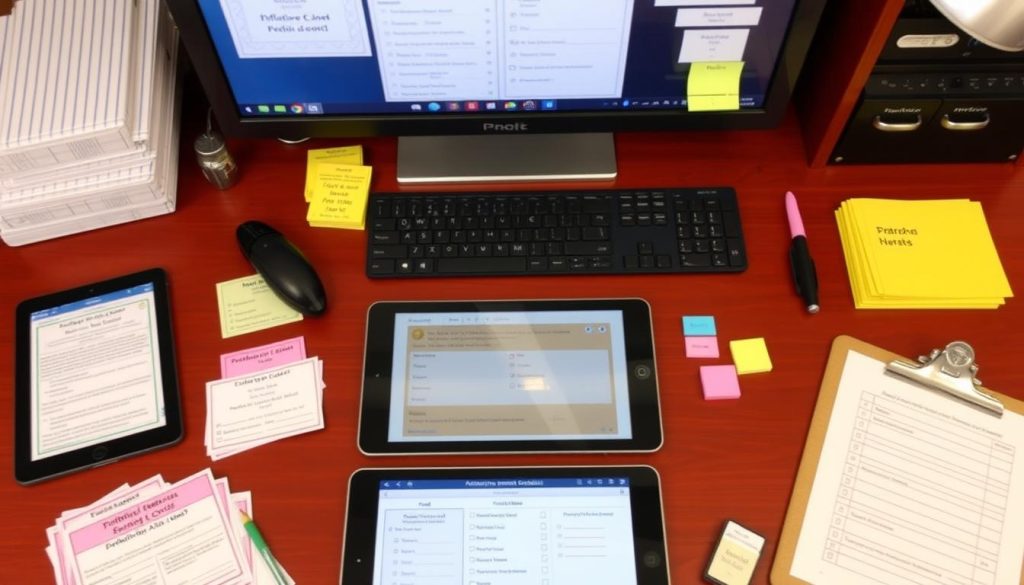
Written Assessment Methods
- Three-Way Summaries: Students write summaries of varying lengths (short, medium, long) to demonstrate understanding
- KWL Charts: Graphic organizers where students record what they Know, Want to know, and have Learned
- Documented Problem Solutions: Students write down each step of their problem-solving process
- Self-Assessment: Students evaluate their own work using the same rubric the teacher uses
Creative Assessment Methods
- Creative Extension Projects: Posters, skits, dioramas, or presentations that demonstrate understanding
- Word Journal: Students summarize a lesson in one word, then explain why they chose that word
- Invented Dialogue: Students create fictional conversations between historical or literary figures
- S.O.S. (Statement, Opinion, Support): Students respond to a statement with their opinion and supporting evidence
Enhancing your teacher skills through mastery of these various formative assessment techniques allows you to better meet the diverse needs of your students. Professional development courses can help you implement these strategies effectively in your classroom.
The Pros of Formative Assessment in Modern Education
Advantages of Formative Assessment
- Real-time feedback: Allows teachers to adjust instruction immediately based on student needs
- Personalized learning: Helps identify individual student strengths and weaknesses
- Increased student engagement: Encourages active participation in the learning process
- Reduced test anxiety: Low-stakes assessments create a less stressful learning environment
- Improved teacher skills: Develops educators’ ability to respond to diverse learning needs
- Enhanced metacognition: Helps students become aware of their own learning processes
- Better learning outcomes: Research shows improved student achievement with regular formative assessment
Immediate Feedback and Instructional Adjustment
One of the most significant benefits of formative assessment is the ability to provide immediate feedback to both teachers and students. This real-time information allows educators to make quick adjustments to their teaching strategies, addressing misconceptions before they become deeply ingrained.
According to a 2019 study published in Assessment in Education, teachers who regularly implement formative assessment techniques show greater flexibility in their instructional approaches and demonstrate improved teacher skills in responding to student needs.

Personalized Learning and Student Empowerment
Formative assessment enables a more personalized approach to education by helping teachers identify exactly where each student stands in their learning journey. This individualized insight allows for targeted interventions and differentiated instruction that meets students where they are.
Additionally, when students receive regular feedback on their progress, they become more empowered in their own learning. They develop a better understanding of their strengths and areas for improvement, which fosters greater autonomy and self-direction.
Enhanced Teacher Skills and Professional Growth
Regular implementation of formative assessment techniques contributes significantly to teacher professional development. Educators who master these methods develop enhanced teacher skills in several areas:
- Data analysis and interpretation
- Responsive teaching techniques
- Differentiated instruction
- Student engagement strategies
- Effective questioning techniques
These enhanced teacher skills not only improve classroom outcomes but also contribute to overall professional growth. Professional development opportunities that focus on formative assessment can help educators refine these important skills.
Enhance Your Formative Assessment Skills
Looking to improve your teacher skills in formative assessment? Our specialized courses provide practical strategies you can implement immediately in your classroom.
The Cons of Formative Assessment: Challenges to Consider
Challenges of Formative Assessment
- Time constraints: Implementing multiple assessments can reduce instructional time
- Resource demands: May require additional materials or technology
- Teacher workload: Increases planning and feedback responsibilities
- Student motivation: Some students may not take ungraded assessments seriously
- Implementation complexity: Requires specific teacher skills and training
- Consistency challenges: Difficult to maintain uniform assessment practices
- Potential for overassessment: Risk of assessment fatigue among students
Time and Resource Constraints
Perhaps the most significant challenge of formative assessment is the time it requires. Developing, implementing, and analyzing multiple assessments throughout a unit can reduce the time available for direct instruction. This is especially challenging in environments with rigid curriculum requirements or high-stakes testing pressures.

Additionally, some formative assessment approaches require specific resources or technology that may not be readily available in all schools. This can create equity issues when teachers in different settings have varying access to the tools needed for effective implementation.
Increased Teacher Workload
Formative assessment, when done thoroughly, significantly increases teacher workload. The continuous cycle of assessing, providing feedback, and adjusting instruction requires substantial time and energy beyond regular teaching duties.
A meta-analysis published in the Review of Educational Research found that while formative assessment is effective, the increased workload is a major barrier to consistent implementation. Developing the necessary teacher skills to manage this workload efficiently requires dedicated professional development and support.
Student Motivation and Engagement Challenges
Since formative assessments are often ungraded or low-stakes, some students may not take them seriously or put forth their best effort. This can undermine the effectiveness of the assessment and provide inaccurate information about student understanding.
Teachers need to develop specific teacher skills to address this challenge, including strategies for increasing student buy-in and helping students understand the value of formative assessment for their own learning journey.
Implementation Complexity
Effective formative assessment requires sophisticated teacher skills that go beyond basic assessment knowledge. These include:
- Ability to ask high-quality questions that reveal student thinking
- Skill in providing constructive feedback that moves learning forward
- Capacity to make quick instructional decisions based on assessment data
- Expertise in differentiating instruction for diverse learners
Without proper training and support, teachers may struggle to implement formative assessment effectively, potentially diminishing its benefits. Professional development resources are essential for building these specialized teacher skills.
Balancing Formative Assessment with Other Evaluation Methods
While formative assessment offers numerous benefits, it’s most effective when used as part of a balanced assessment approach. Understanding how to integrate formative assessment with summative assessment and other evaluation methods is a crucial teacher skill that can maximize the benefits while minimizing the drawbacks.
| Assessment Type | Purpose | Timing | Examples | Teacher Skills Required |
| Formative Assessment | Monitor learning progress | During instruction | Exit tickets, polls, discussions | Responsive teaching, feedback delivery |
| Summative Assessment | Evaluate learning outcomes | End of unit/course | Tests, projects, final exams | Comprehensive evaluation, grading |
| Diagnostic Assessment | Identify prior knowledge | Before instruction | Pre-tests, KWL charts | Gap analysis, planning |
| Performance Assessment | Evaluate applied skills | Throughout learning | Projects, presentations | Authentic task design, rubric creation |

Creating a Comprehensive Assessment Strategy
Developing a comprehensive assessment strategy requires specific teacher skills in planning and implementation. Here are some key considerations:
- Purpose alignment: Ensure each assessment serves a clear purpose in the learning journey
- Timing considerations: Schedule assessments strategically to maximize instructional impact
- Variety of methods: Use diverse assessment approaches to accommodate different learning styles
- Feedback mechanisms: Establish clear processes for providing timely feedback
- Data utilization: Develop systems for using assessment data to inform instruction
By thoughtfully integrating formative assessment with other evaluation methods, teachers can create a more complete picture of student learning while addressing some of the challenges associated with any single assessment approach.
Implementing Formative Assessment: Best Practices for Teachers
Successfully implementing formative assessment requires specific teacher skills and strategic planning. Here are practical guidelines to help you integrate these techniques effectively into your classroom routine while minimizing potential drawbacks.
Starting Small and Building Gradually
One of the most effective approaches to implementing formative assessment is to start small and gradually expand your repertoire. This strategy helps manage the increased workload while allowing you to refine your teacher skills in specific assessment techniques.
Week 1-2: Quick Checks
- Implement simple exit tickets 1-2 times per week
- Try thumbs up/down checks during lessons
- Practice strategic questioning techniques
Week 3-4: Interactive Methods
- Introduce think-pair-share activities
- Experiment with classroom polls
- Try one round robin chart activity
Week 5-6: Written Methods
- Implement KWL charts for a new unit
- Try three-way summaries for a key concept
- Introduce self-assessment for one assignment
Week 7-8: Creative Methods
- Assign a small creative extension project
- Try the word journal technique
- Implement S.O.S. for a complex topic

Efficient Feedback Strategies
Providing timely feedback is essential to effective formative assessment, but it can also be time-consuming. Developing efficient feedback strategies is a critical teacher skill that can help manage the workload while maximizing impact.
- Whole-class feedback: Address common misconceptions with the entire class rather than individually
- Peer feedback: Train students to provide constructive feedback to each other using clear guidelines
- Targeted feedback: Focus detailed feedback on the most critical aspects of learning
- Digital tools: Utilize technology to streamline feedback processes when appropriate
- Feedback templates: Develop reusable templates for common feedback scenarios
Building Student Buy-in
Addressing the challenge of student motivation requires specific teacher skills in communication and relationship-building. Here are strategies to increase student buy-in for formative assessment:
- Explain the purpose: Help students understand how formative assessment benefits their learning
- Demonstrate growth: Show students evidence of their progress based on previous assessments
- Incorporate student voice: Allow students to have input on assessment methods when appropriate
- Make it engaging: Use game-based assessments and technology to increase interest
- Celebrate improvement: Recognize and celebrate growth, not just achievement
Developing these specialized teacher skills can significantly enhance the effectiveness of your formative assessment practices. Professional development courses focused on assessment can provide additional strategies and support.
Leveraging Technology for Effective Formative Assessment
Technology can be a powerful tool for addressing many of the challenges associated with formative assessment. Digital tools can help streamline the process, reduce teacher workload, increase student engagement, and provide more immediate feedback. Developing teacher skills in educational technology is increasingly important for effective assessment practices.
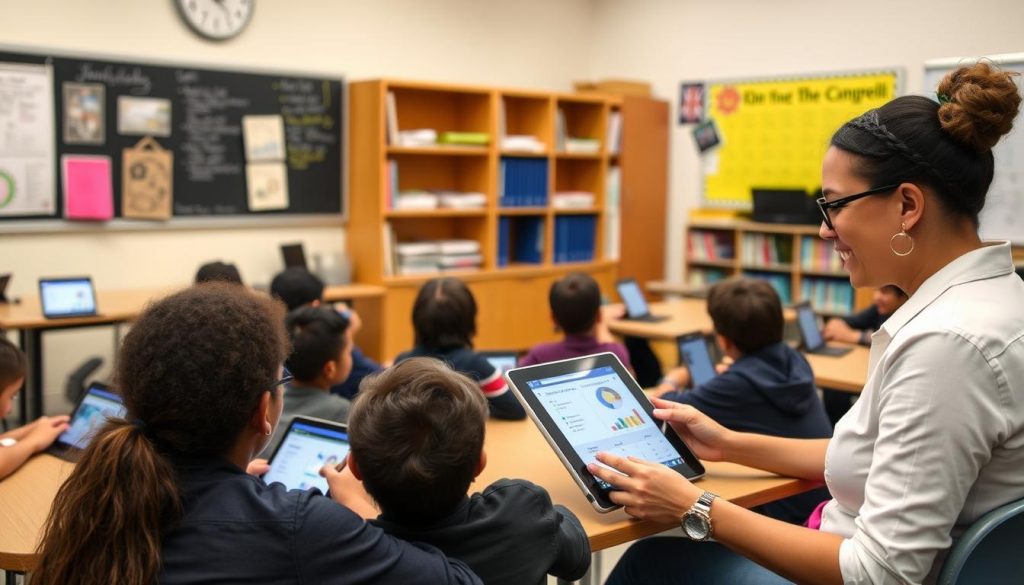
Digital Formative Assessment Tools
There are numerous digital tools designed specifically for formative assessment that can enhance your teacher skills in this area:
Interactive Response Tools
- Kahoot! – Game-based assessment platform
- Poll Everywhere – Real-time polling tool
- Socrative – Quiz and assessment platform
Content Creation Tools
- Padlet – Digital bulletin board for responses
- Flipgrid – Video discussion platform
- Nearpod – Interactive lesson platform
Feedback Tools
- Formative – Real-time student response tool
- Seesaw – Digital portfolio platform
- Google Forms – Customizable assessment tool
Benefits of Technology-Enhanced Assessment
Integrating technology into your formative assessment practices offers several advantages:
- Immediate data collection: Instantly gather and analyze student responses
- Reduced grading time: Automated scoring for certain types of assessments
- Increased student engagement: Interactive and game-based assessment options
- Enhanced feedback: Tools for providing more timely and detailed feedback
- Better data visualization: Graphical representations of student performance
- Accessibility: Options for accommodating diverse learning needs
Overcoming Technology Challenges
While technology can enhance formative assessment, it also presents its own challenges. Developing teacher skills in technology troubleshooting and planning is essential:
- Have backup plans: Always prepare non-digital alternatives in case of technical issues
- Start simple: Begin with user-friendly tools and gradually increase complexity
- Provide clear instructions: Ensure students understand how to use the technology
- Address equity concerns: Consider access issues and provide alternatives when needed
- Focus on pedagogy: Remember that technology is a tool, not a replacement for good teaching
Enhancing your teacher skills in educational technology can significantly improve your formative assessment practices. Professional development opportunities focused on technology integration can provide valuable support in this area.
Formative Assessment in Action: Real Classroom Case Studies
Examining real-world applications of formative assessment can provide valuable insights into how these techniques work in practice. The following case studies highlight how teachers have successfully implemented formative assessment strategies while addressing common challenges.
Elementary School Case Study: Exit Tickets Revolution
Teacher: Maria Rodriguez, 3rd Grade
Challenge: Managing the workload of reviewing daily exit tickets for 28 students
Solution: Maria developed a rotating system where she deeply reviewed exit tickets from only 5-7 students each day, completing a full class cycle each week. She used a simple color-coding system (green/yellow/red) to quickly identify students needing immediate intervention.
Results: This approach reduced her daily review time from 45 minutes to 15 minutes while still providing regular feedback to all students. She reported significant improvements in her teacher skills related to time management and targeted intervention.
Key Takeaway: Strategic sampling can make formative assessment more manageable without sacrificing effectiveness.
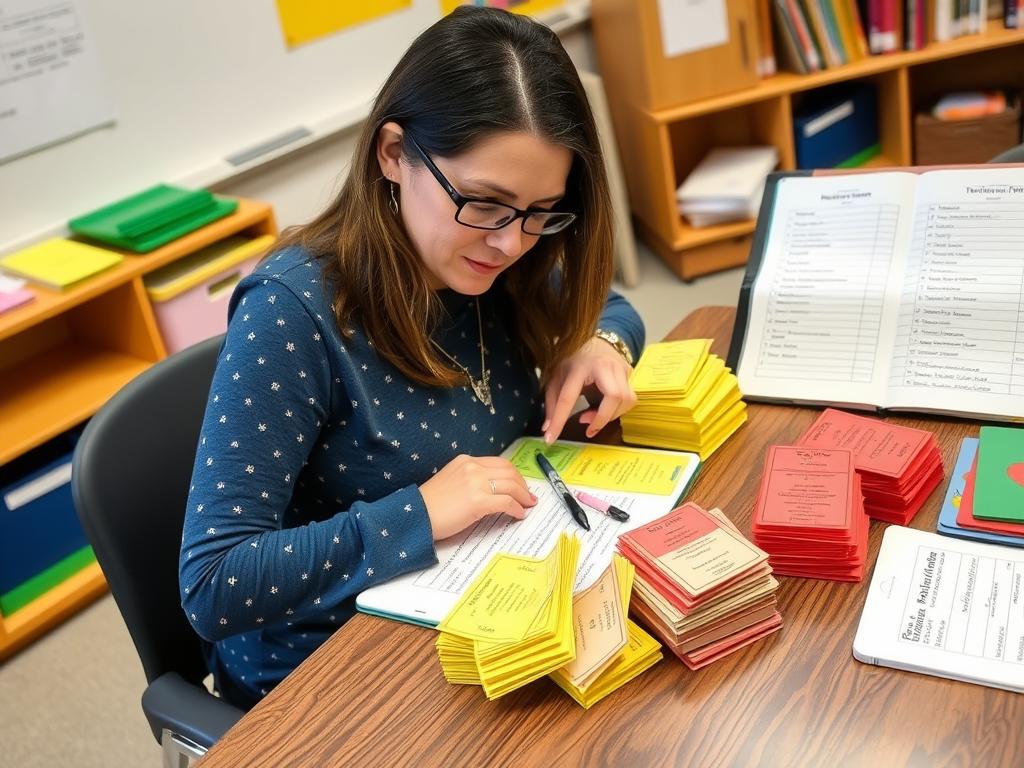
Middle School Case Study: Technology Integration
Teacher: James Wilson, 7th Grade Science
Challenge: Low student engagement with traditional formative assessment methods
Solution: James implemented digital formative assessment tools including Kahoot! for quick knowledge checks and Flipgrid for more in-depth concept explanations. He scheduled these activities strategically throughout his units to maintain student interest.
Results: Student participation increased from 65% to 92%, and performance on summative assessments improved by an average of 14%. James noted significant growth in his teacher skills related to technology integration and student engagement strategies.
Key Takeaway: Technology can significantly enhance student buy-in for formative assessment when used purposefully.
High School Case Study: Peer Feedback System
Teacher: Sarah Johnson, 10th Grade English
Challenge: Providing timely, detailed feedback on writing assignments for 120+ students
Solution: Sarah developed a structured peer feedback system where students used specific rubrics to provide initial feedback to classmates. She then reviewed both the student work and peer feedback, adding her own insights where needed.
Results: This approach reduced her feedback time by approximately 40% while actually increasing the quality of student revisions. Students reported greater engagement in the writing process and better understanding of assessment criteria. Sarah’s teacher skills in facilitation and rubric design significantly improved.
Key Takeaway: Well-structured peer feedback can extend the teacher’s capacity while providing valuable learning experiences for students.
These case studies demonstrate how teachers have successfully addressed common challenges associated with formative assessment through creative solutions and ongoing professional development. Enhancing your teacher skills through specialized courses can help you develop similar strategies for your own classroom.
Enhancing Teacher Skills Through Formative Assessment Training
Professional development focused specifically on formative assessment can significantly enhance your teacher skills and help you overcome the challenges associated with implementation. Research consistently shows that teachers who receive specialized training in assessment practices are more effective at improving student outcomes.
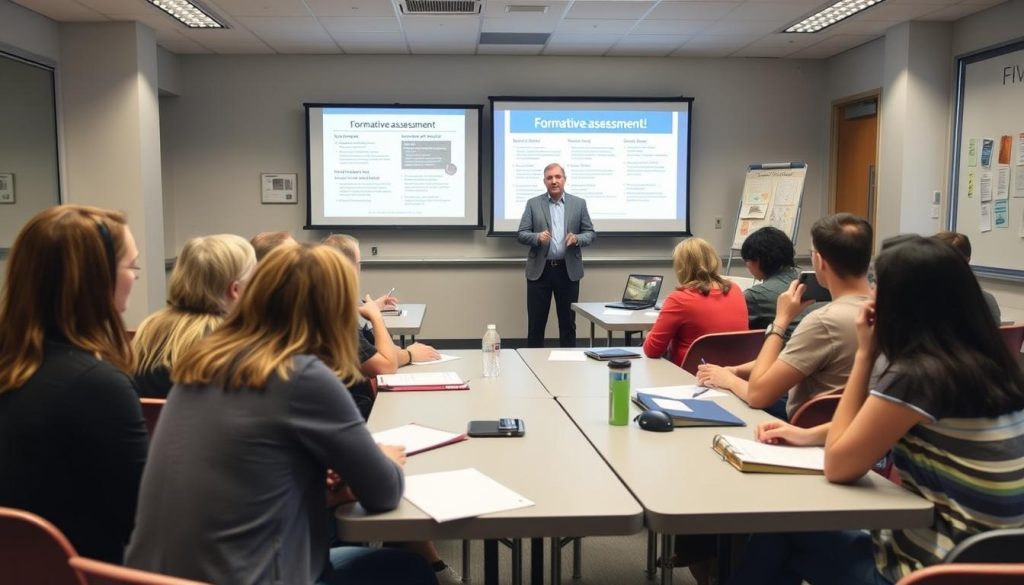
Key Areas for Professional Development
Effective professional development for formative assessment should focus on several key areas:
Assessment Design Skills
- Creating effective questions that reveal student thinking
- Designing assessments aligned with learning objectives
- Developing rubrics that support learning
- Creating assessments for diverse learners
Feedback Skills
- Providing timely, specific feedback
- Balancing positive reinforcement with constructive criticism
- Teaching students to use feedback effectively
- Managing the feedback workload
Data Analysis Skills
- Interpreting assessment results accurately
- Identifying patterns and trends in student performance
- Using data to inform instructional decisions
- Tracking student progress over time
Technology Integration Skills
- Using digital assessment tools effectively
- Managing online assessment data
- Creating digital assessment materials
- Troubleshooting common technology issues
Professional Development Options
There are numerous ways to enhance your teacher skills in formative assessment:
- Formal courses: Structured courses specifically focused on assessment practices
- Workshops and seminars: Short-term, intensive training on specific assessment techniques
- Professional learning communities: Collaborative groups of teachers focused on improving assessment practices
- Coaching and mentoring: One-on-one support from experienced practitioners
- Online resources: Webinars, articles, and videos on assessment strategies
Advance Your Assessment Skills
Ready to take your formative assessment practices to the next level? Our specialized courses provide practical strategies and techniques that you can implement immediately in your classroom.
Finding the Right Balance: Making Formative Assessment Work for You
Formative assessment offers powerful benefits for both teachers and students, but it also presents real challenges that must be addressed thoughtfully. The key to success lies in finding the right balance—implementing these techniques in ways that maximize their advantages while minimizing their drawbacks.

Remember that formative assessment is not a one-size-fits-all approach. What works in one classroom or subject area may not work in another. The most effective teachers develop their own personalized approach based on their specific context, student needs, and teaching style.
As you continue to develop your teacher skills in formative assessment, consider these final recommendations:
- Start small and build gradually: Begin with a few simple techniques and expand your repertoire over time
- Focus on quality over quantity: A few well-designed assessments are more valuable than many superficial ones
- Prioritize student learning: Keep the focus on how assessment improves learning, not just on collecting data
- Be flexible and adaptive: Adjust your approach based on what works for your students
- Seek ongoing professional development: Continue to enhance your teacher skills through training and collaboration
By thoughtfully implementing formative assessment techniques and continuously refining your approach, you can create a more responsive, effective learning environment that benefits all students. The investment in developing these teacher skills will pay dividends in improved student outcomes and a more satisfying teaching experience.
Continue Your Professional Growth
Ready to enhance your teacher skills and transform your assessment practices? Explore our comprehensive resources and courses designed specifically for K-12 educators.

